"Bees, it is said, are the most studied creatures on the planet after man."
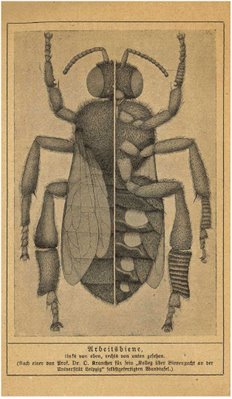
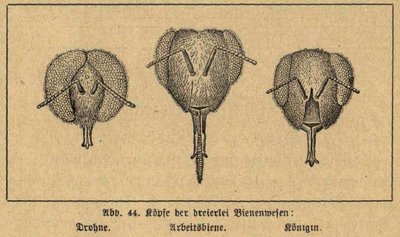

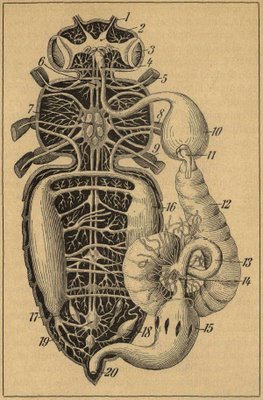
The above images are from: 'Leben und Zucht der Honigbiene -
ein gemeinverständliches Lehrbuch über Behandlung der Bienen und
über Tätigkeit, Nutzen und Anatomie der Biene' 1922 by Oskar Krancher.
ein gemeinverständliches Lehrbuch über Behandlung der Bienen und
über Tätigkeit, Nutzen und Anatomie der Biene' 1922 by Oskar Krancher.
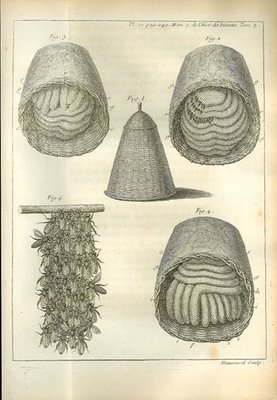
'Mémoires Pour Servir à l'Histoire des Insectes' by
entomologist René-Antoine Ferchault de Réaumur, 1735.
entomologist René-Antoine Ferchault de Réaumur, 1735.
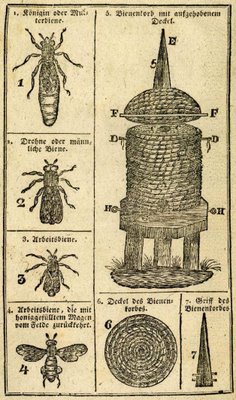
'Kurze und leichtfaßliche Anleitung zur Bienenzucht und
Bienenpflege' by A. Niemandsfreund; F. Huber, 1831.
Bienenpflege' by A. Niemandsfreund; F. Huber, 1831.

'Der praktische Bienenvater oder Anleitung zu einer
zweckmäßigen Bienenzucht - mit besonderer Hinsicht auf
kältere Gegenden' by Samuel Ruffiny, 1832.
zweckmäßigen Bienenzucht - mit besonderer Hinsicht auf
kältere Gegenden' by Samuel Ruffiny, 1832.

'Klaus, der Bienenvater aus Böhmen' by Johann Nepomuk Oettl, 1857.
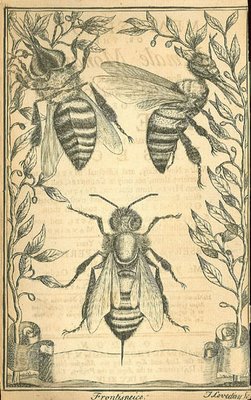
'Melisselogia. Or, the female monarchy. Being an enquiry into the nature, order, and government of bees, those admirable, instructive and useful insects. With a new, easy, and effectual method to preserve them, not only in colonies, but common hives, from that cruel death, to which their ignorant, injurious, and most ingrateful owners so commonly condemn them. A Secret uknown to past ages and now published for the benefit of Mankind. Written upon forty years observation and experience by the Reverend Mr John Thorley of Oxon.' 1744
[the above plate is obviously copied from the groundbreaking work that included the first sketches of bees using a microscope: Melissographia by Francesco Stelluti in ~1624]
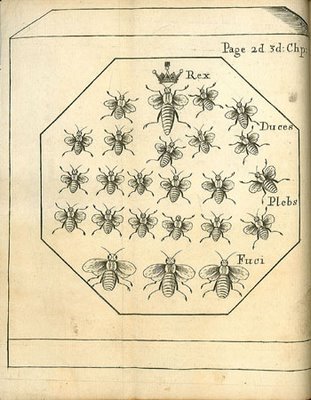
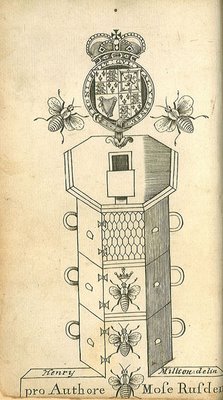
'A Further Discovery of Bees' by Moses Rusden, 1679.
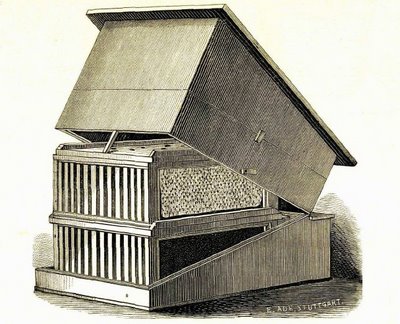
'Die Honigbiene und die Vermehrung der Bienenvölker nach
den Gesetzen der Wahlzucht' by Friedrich Wilhelm Vogel, 1880.
den Gesetzen der Wahlzucht' by Friedrich Wilhelm Vogel, 1880.
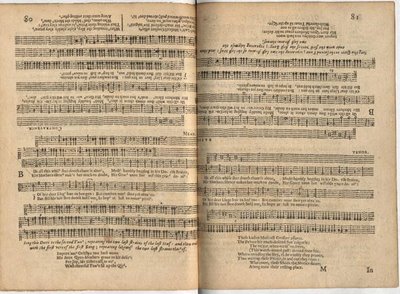
'The Feminine Monarchie' by the polymath, Charles Butler, 1609.
This is arguably the single most influential or at least important apiculture book ever released in the english language. Butler conclusively overturned the prevailing myth of bee patriarchy (note the 'Rex' in the Rusden illustration above) by identifying the Queen as female ruler and the drones as male. [the theory was more fully elucidated later by Jan Swammerdam]The background to this music sheet image is quite extraordinary. Butler was attempting to transcribe bee sounds in musical notation. What began as a simple triplicate metre representation of rival queen bee sounds in the first edition was augmented later to become a madrigal [multi-voice unaccompanied by music] for 4 singers with the music appearing in such a way (click to enlarge) that a soprano and tenor on one side of the page could read the music at the same time as the countertenor and bassus on the opposite side. {The enigmatic Butler also included original grammatical inventions in his books (that are annoying to some)}.
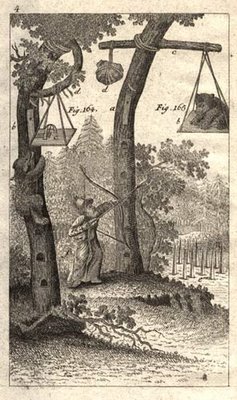
'Oeconomische Encyclopädie' by Johann Georg Krünitz, 1774 .

This is one of four sketches [touched up] produced by EJ Detmold as an
accompaniment to the first childrens' version of Maurice Maeterlinck's
philosophical treatise about bees 'La Vie des Abeilles" (The Life of Bees).
[There is a later version called 'News of Spring' - or it's a compilation -
with about 20 - what looks like - gorgeous Detmold illustrations
{addit: more Detmold insect illustrations here}]
accompaniment to the first childrens' version of Maurice Maeterlinck's
philosophical treatise about bees 'La Vie des Abeilles" (The Life of Bees).
[There is a later version called 'News of Spring' - or it's a compilation -
with about 20 - what looks like - gorgeous Detmold illustrations
{addit: more Detmold insect illustrations here}]
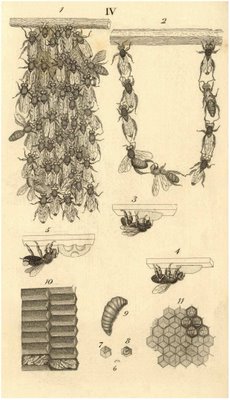
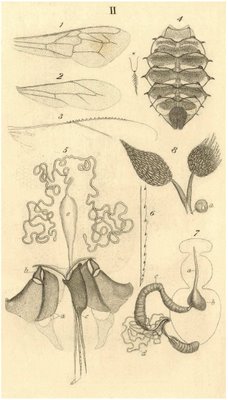

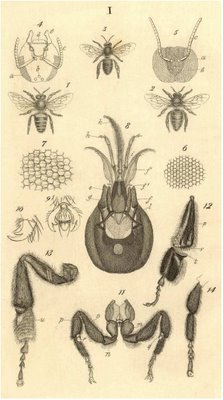
'Naturgeschichte der gemeinen Honig - oder Hausbiene,
(Apis mellifica L., Abeille domestique, Hive-bee) als Grundlage
einer rationellen Bienenzucht' by August Menzel, 1855.
(Apis mellifica L., Abeille domestique, Hive-bee) als Grundlage
einer rationellen Bienenzucht' by August Menzel, 1855.
These are simply a selection of images from historical books on apiculture and aren't intended to represent the most important works necessarily. As is always the case in a subject review here, finding suitable images is the first priority and obviously the most significant books aren't always filled with the greatest artwork. There is a relative overabundance of german works for no other reason than as a rationalisation to myself for having blindly downloaded somewhere north of 1/2 gigabyte of pdf books.
- Mann Library at Cornell University is said to house the largest and most valuable collection of bee/apiculture literature in the world -- 'The Hive and the Honeybee' digital collection of apiculture books are all unfortunately in photocopy format. 'A Buzz about Bees' is an exhibition site featuring bee literature from the last 400 years.
- 'Apiculture and Culture: Books on Bees and Beekeeping' exhibition at the University of Massachussets.
- The Moir Rare Book Collection at the National Library of Scotland.
- The majority of the german works above were found at the Universitätsbibliothek Frankfurt am Main edocs site ('Bienen- und Imkerliteratur') which has 54 pdf historical books on apiculture. [inadvertently via NetBib - who are thus to blame for this post]
- 'What's the Buzz About?' by GS Robinson from the Times Literary Supplement 2005.
- 'Our hives, Ourselves - Why we've never been able to resist finding human-sized meanings in bee-sized hives' by J Glenn from The Boston Globe 2005.
- There are a million sites online if apiary, beekeeping, bees, apiculture and honey are your pleasure - EAS have an ordered array of links.
May I humbly suggest Bee (yes, truly) Wilson's excellent The Hive as a gentle introduction into the wonderful world the honeybee. Easy to read and chock full of information.
ReplyDeleteGod, I love these. Naturalism meets the Hapsburgs.
ReplyDelete